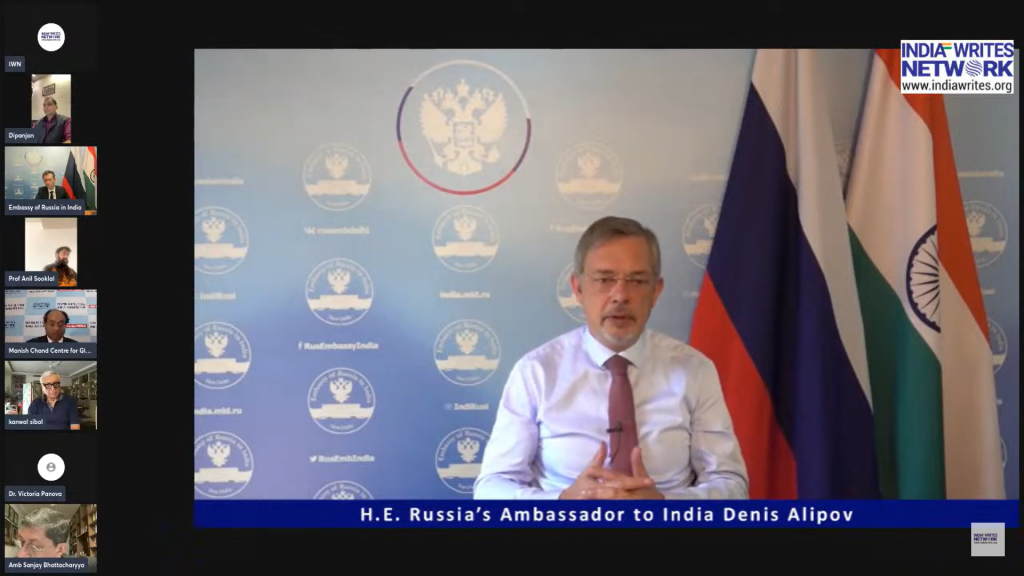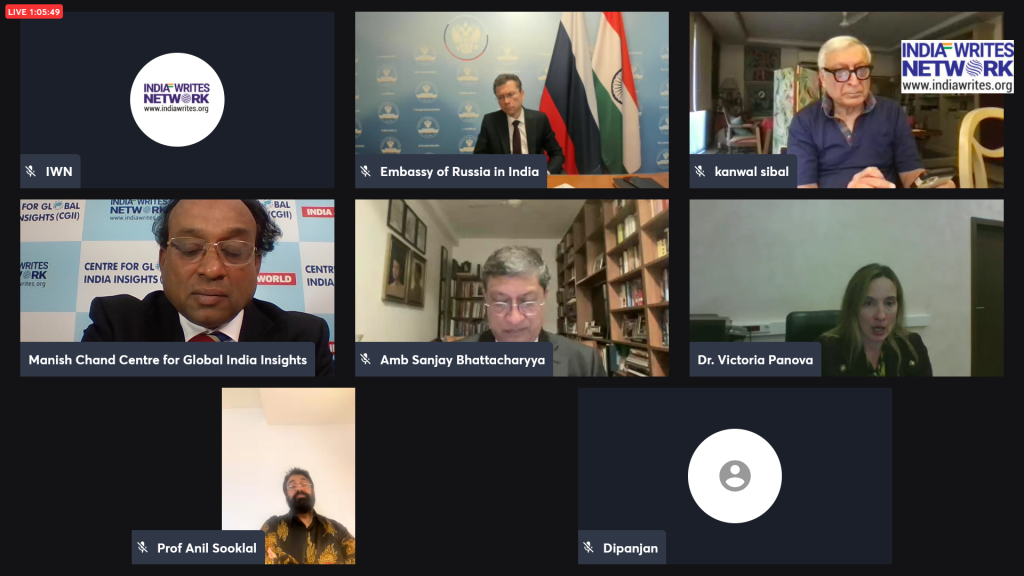 By Huma Siddiqui
By Huma Siddiqui
Ahead of the 16th BRICS summit in Kazan on October 22-24, Russian Ambassador to India Denis Alipov said that he looked forward to welcoming Prime Minister Modi and underlined that the expansion of BRICS will bolster the grouping’s roles as a platform for advancing the Global
South interests. The planned expansion of the BRICS will top the agenda at the first summit of the
leaders of the expanded BRICS on October 22-24. Speaking at the conference, the Russian envoy said: “BRICS has become an influential platform for developing and emerging economies to take forward a rich agenda and to promote democratization of the global governance reflective of our
growing influence,” said the Russian envoy in his keynote address. “BRICS respects civilizational diversity and offers the platform for mutually beneficial dialogue free from pressure, double standards or interference in domestic affairs,” he said.

Alluding to the expansion of the grouping at the 16th BRICS summit in Kazan, the Russian envoy said: “No wonder that a large number of countries has expressed interest in joining, and we see it natural for BRICS to expand in one way or another. After our membership has doubled last year, which is itself a landmark, we move towards the establishment of a partner-country category to enable interested states to join our practical cooperation.” The conference was moderated by Manish Chand, CEO, Centre for Global India Insights and Editor, “India’s G20 legacy: Shaping a New World Order.” “The Global South is rising, and the North is waking up to the urgency of accommodating rising
and emerging powers, along with other developing countries, in this emerging global order. This is where the BRICS summit in Kazan will reflect this desire to forge an inclusive world order,” said
Mr. Chand. The theme of the Russian presidency for the summit is “Strengthening Multilateralism for Equitable Global Development and Security.” Eminent diplomats and experts spoke at the conference, including South Africa’s High Commissioner-designate to India Anil Sooklal, Amb. Kanwal Sibal, a former foreign secretary, Amb. Sanjay Bhattacharya, India’s former BRICS sherpa, Victoria Pannova, a Russian expert on BRICS and Dipanjan Roy Chaudhary, Diplomatic Editor, Economic Times.
Race to join BRICS
The five old members of BRICS functioned very well all these years, and now we have new members who will soon adjust to the ways BRICS conducts its business and promotes its growth,” said Mr. Sooklal. He lauded the expansion as a “positive development,” reflecting the global community’s demand for new leadership. “This is why we see so many countries from the Global South, and even some from the Global North, knocking on BRICS door,” Mr. Sooklal said, underscoring BRICS’ growing stature. However, he also acknowledged the challenges of maintaining consensus, revealing that,
for the first time, BRICS foreign ministers were unable to issue a media statement following their meeting in New York due to differing viewpoints. Despite these challenges, Sooklal remained
confident that a substantive summit outcome document would be achieved under Russia capable leadership. He emphasized that BRICS’ decision to expand had not diluted the bloc but rather
strengthened it, introducing a tiered membership structure that included full members and partner countries.
Anti-West or non-West
Amb. (Retd.) Kanwal Sibal, presented a nuanced perspective, expressing cautious optimism about the expansion. Sibal recognized that while the expansion of BRICS allows greater participation from
the Global South, it also brings complexities, especially in the context of the West’s current adversarial relationship with key BRICS members like Russia and China. “The global system is
heavily biased in favor of the West,” Sibal remarked, adding that the West remains reluctant to accept the shifts in global power dynamics. He emphasized that India, while benefiting from its strong
relations with the West, must carefully navigate its ties with BRICS, ensuring that the bloc does not evolve into an anti-West organization. Sibal also highlighted the potential hurdles in efforts to de-dollarize or create alternatives to the global financial system, noting that such initiatives would require a realistic and cautious approach. Amb. (Retd.) Bhattacharya stressed that the New Development Bank (NDB) is a vital tool for the grouping, providing infrastructure finance to both BRICS and non-BRICS countries without the usual conditionalities imposed by Bretton Woods
institutions. He argued that while BRICS cannot single-handedly reform global governance, it plays a crucial role in promoting economic equity, fostering a more just global order. Other speakers, including Dipanjan Roy Chaudhary, Victoria Panova, and Nicolas Buchoud, also contributed their insights. Chaudhary highlighted the limited media coverage BRICS receives in India, noting
that interest spikes only around the time of summits. He pointed to the growing curiosity about BRICS in Southeast Asia, particularly with countries like Thailand, Vietnam, and Indonesia
expressing interest in deeper engagement with the bloc. Victoria Panova added that
BRICS, unlike other global groupings, has always been inclusive, promoting dialogue
both within and outside its member states. Nicolas Buchoud, with his expertise in urban infrastructure,discussed the opportunities for BRICS to promote sustainable infrastructure
development, particularly in light of global challenges such as climate change and fragmented geoeconomics.
The conference highlighted both the promise and the challenges of an expanded BRICS. While the bloc’s growing influence is undeniable, the increasing diversity of its membership may complicate decision-making processes. However, as many speakers stressed, the strength of BRICS lies in its ability to foster consensus and promote the interests of the Global South in an increasingly
multipolar world. As the world watches the upcoming BRICS Summit in Kazan, it remains to be seen how the expanded bloc will navigate its internal dynamics while continuing to push for a more equitable global order.
Author Profile
- India Writes Network (www.indiawrites.org) is an emerging think tank and a media-publishing company focused on international affairs & the India Story. Centre for Global India Insights is the research arm of India Writes Network. To subscribe to India and the World, write to editor@indiawrites.org. A venture of TGII Media Private Limited, a leading media, publishing and consultancy company, IWN has carved a niche for balanced and exhaustive reporting and analysis of international affairs. Eminent personalities, politicians, diplomats, authors, strategy gurus and news-makers have contributed to India Writes Network, as also “India and the World,” a magazine focused on global affairs.
Latest entries
 DiplomacyJanuary 5, 2026India walks diplomatic tightrope over US operation in Venezuela
DiplomacyJanuary 5, 2026India walks diplomatic tightrope over US operation in Venezuela India and the WorldNovember 26, 2025G20@20: Africa’s Moment – The Once and Future World Order
India and the WorldNovember 26, 2025G20@20: Africa’s Moment – The Once and Future World Order DiplomacyOctober 4, 2025UNGA Resolution 2758 Must Not Be Distorted, One-China Principle Brooks No Challenge
DiplomacyOctober 4, 2025UNGA Resolution 2758 Must Not Be Distorted, One-China Principle Brooks No Challenge India and the WorldJuly 26, 2025MPs, diplomats laud Operation Sindoor, call for national unity to combat Pakistan-sponsored terror
India and the WorldJuly 26, 2025MPs, diplomats laud Operation Sindoor, call for national unity to combat Pakistan-sponsored terror







